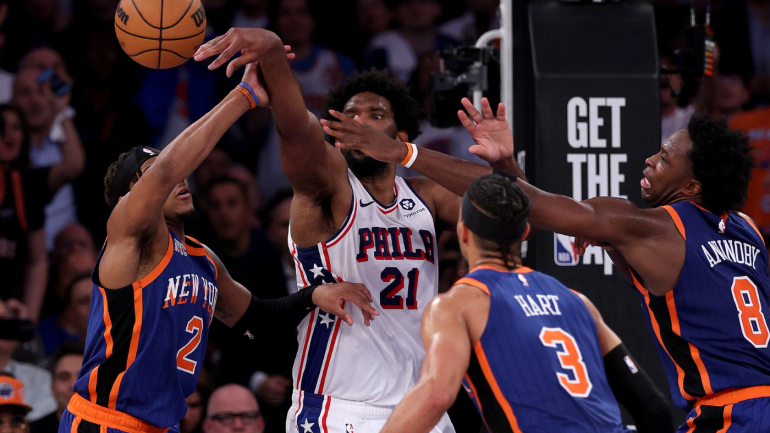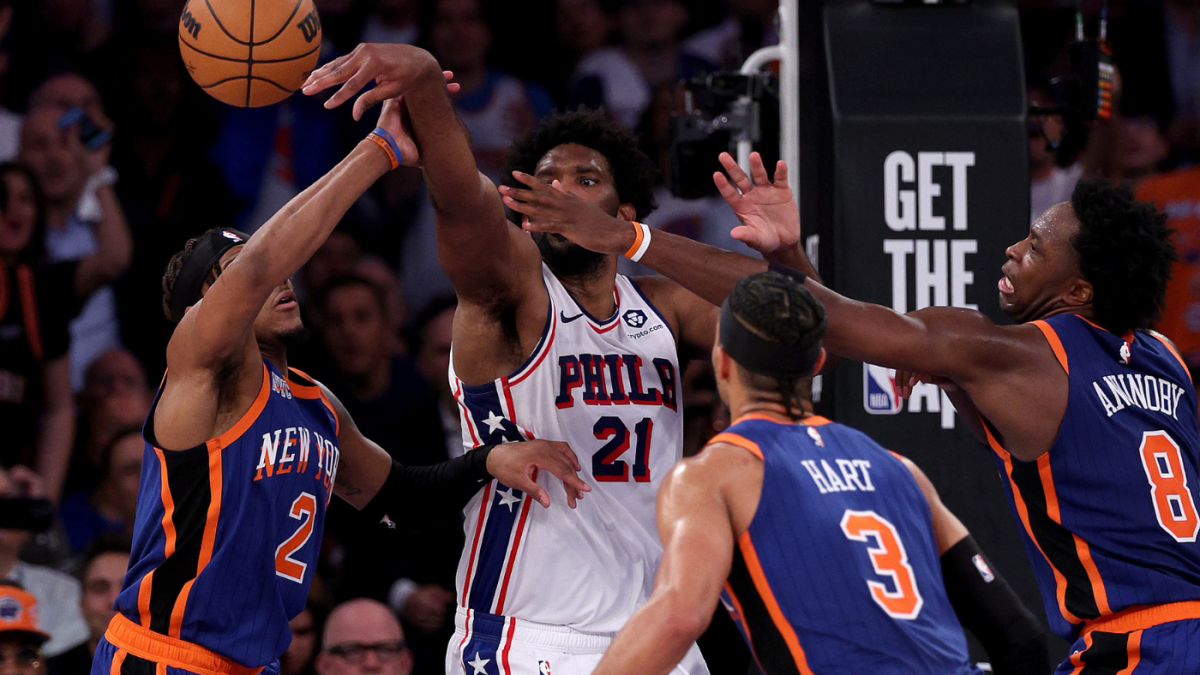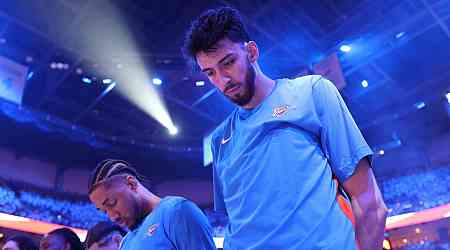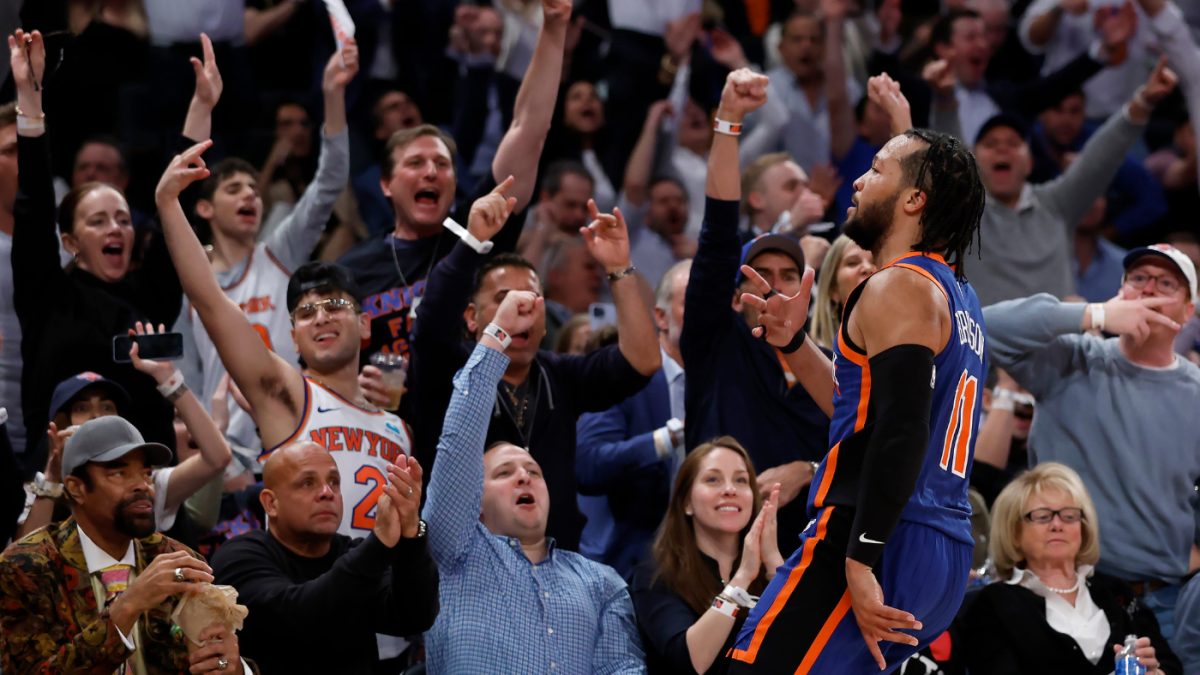
At halftime of Game 5 of their first-round series against the New York Knicks on Tuesday, Philadelphia 76ers coach Nick Nurse was "pretty disappointed," he said.
Nurse wasn't upset with the way the Sixers were playing. The process, particularly when it came to dealing with the Knicks' double-teams against Joel Embiid, was sound. But the results weren't there.
"We were getting unbelievable shots, he was making great reads off of all the double-teams, we weren't making any," Nurse said. "And it got our defense a little frazzled there, too."
Philadelphia trailed 49-43 heading into the second half, and it scored a putrid 77.3 points per 100 possessions in the second quarter. Part of this was because the team predictably fell apart when Embiid was on the bench; part of it was because it couldn't always capitalize on the opportunities it had when he was on the floor.
"We looked at ourselves; we were like, I mean, those are great shots, they're wide open," Embiid said after the Sixers' 112-106 overtime win. "And that's where I've had to learn that it's all about keep trusting it."
By my count, New York double-teamed Embiid in isolation or post-up situations seven times in the first half. Five of those times, the Sixers got a good look out of it. The other two times, Embiid turned the ball over.
"New York, they had a game plan: They double every single possession," Embiid said. He added that he simply tried to "keep making the right passes, the right plays over and over and over," and that "it ended up paying off at times, and at times we missed a lot of wide-open ones."
Given how poorly Embiid played after halftime, though, New York might not be inclined to change its strategy. Embiid finished the game with 19 points on 7-for-19 shooting and nine turnovers to go with his 10 assists. "It looked like he just rushed a couple, from what I could tell," Nurse said of the turnovers. About halfway through the fourth quarter, after what Nurse described as "a really, really, really uncharacteristic stretch of plays" -- three turnovers and two missed shots in less than four minutes -- the Sixers briefly took him out of the game.
The pro-doubling argument is straightforward: The Knicks earned a win in the fourth quarter of Game 4 by having OG Anunoby front Embiid and doubling him much more aggressively than Thibodeau's teams usually do, and the offensive end was where they struggled in Game 5. Embiid proved he deserved lots of defensive attention when he dropped 50 points in Game 3, and, since then, he hasn't proven that he can handle this attention for a whole game while dealing with a knee injury and the effects of Bell's palsy. (In the third quarter of Game 4, before New York had even made its big adjustment, he turned the ball over three times in two minutes.) Single coverage sounds nice, particularly when Embiid isn't himself physically, but it risks putting Isaiah Hartenstein and Mitchell Robinson in foul trouble.
There is a case to be made, however, for dialing the double-teams back, if only because Embiid's post-ups and isolations aren't necessarily the Knicks' biggest concerns. After giving up 46 points on 17-for-30 shooting to Maxey, anything that nudges the Sixers' offense away from the Maxey-Embiid pick-and-roll is worth considering.
"You gotta pick your poison: either him or Joel," New York's Jalen Brunson said.
And while you can't completely blame double-teams for Maxey's legendary performance or Tobias Harris scoring 19 points on 7-for-11 shooting, the open 3s they made in the opening minutes of Game 5 surely didn't hurt their confidence. In the minds of many basketball purists, there are benefits that come with simply making everybody feel involved.
"I think [passing out of double-teams] got a lot of our guys in rhythm, even with the misses," Embiid said. "As long as you touch the ball and you shoot it, you're going to get more opportunities to make the next one."
The fundamental trade-off here -- make the superstar uncomfortable and live with other players getting good looks, or vice versa -- is no different for Thibodeau than it is for any other coach this time of year. What makes this particular decision interesting, though, is all of the variables involved: Embiid's health, the Sixers' spacing, the Knicks' defensive connectivity and the lineups on the floor, to name a few. New York was only able to get away with the Anunoby-on-Embiid gambit four days ago because Precious Achiuwa and Josh Hart were flying all over the place (and Philadelphia's wings were cutting on top of each other).
"Any time you put two onto the ball, everyone else has to be tied [together] along with that," Thibodeau said. "So, you can't miss anything. If one guy's not doing his job, the whole thing will break down."
How the Knicks respond the first time that Embiid puts the ball on the floor against Hartenstein in Game 6 on Thursday will tell us something about Thibodeau's priorities. He has shown in this series, though, that he is adaptable. The furious look on his face when Hartenstein picked up his fifth foul in Game 4 suggests that he didn't anticipate rolling with the Anunoby-Achiuwa chaos frontcourt for the rest of the game, but, because the Sixers didn't make New York pay, he stuck with it. In theory, Embiid's improvement as a passer -- combined with the fact that Maxey, Kyle Lowry and Nicolas Batum all made more than 40% of their catch-and-shoot 3s this season -- means that consistently double-teaming him is not a great idea, but the calculus changes if Embiid is tired and making poor decisions or if his teammates aren't knocking shots down.
If Thibodeau elects to guard Embiid more conservatively, the adjustment could be seen as a compliment to Maxey, a challenge to Embiid or a vote of confidence in the Knicks' bigs. Regardless of the reasoning, it would then become Embiid's responsibility to make New York reconsider by cooking his defender one-on-one. The beauty of the playoffs is that it's not about what tactic should work in a probabilistic sense; it's about what you can get away with.































